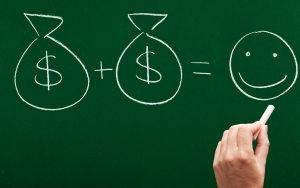Is there anyone around us, or us, who could say that he/she is %100 happy, or has anybody reached the will-o’-the-wisp “Aristoteles happiness”? Hard to tell.
Especially, 1950 “High Time” America, Post-Cold War Era, The Spread of Television into Greater Masses and irreplaceable internet started this unhappy, unsatisfied and freewheeling spirit. One has no chance to absorb a landscape, a movie, a development because the world agenda changes so fast and furious.

Let’s take “money” as the vital pillar of our lives. Does money make us happy? Me for instance, I’d rather walk in the forest or go for horse-riding than shop in a crowded street or dine in a “chock full” restaurant.
“Research in the journal Psychological Science proves my theory behind happiness. It clearly shows that money spent on doing, rather than by buying things, works. Apparently an experience, such as a holiday or going skydiving, brings more happiness than a good shopping spree.”

Well, I don’t know how solid and reliable this source is, but here’s the mathematical formula rumored to have unchained the secrets to happiness.
By the by, scientists have determined that happiness depends on whether things are better or worse than expected.
Max Planck University College London Centre for Computational Psychiatry and Ageing Research, Robb Rutledge and colleagues designed a study looking at the relationship between rewards and happiness.
“Based on the data, we developed a mathematical equation to predict how self-reported happiness depends on past events,” says Rutledge, writing about it for the OECD. “We found that happiness depends not on how well things are going, but whether things are going better or worse than expected.”
For those who like mathematics, here’s the formula the researchers came up with for happiness:

The formula explained in brief:
“Happiness depends on safe choices (certain rewards, CR), expectations associated with risky choices (expected value, EV), and whether the outcomes of risky choices were better or worse than expected. This final variable is called a reward prediction error (RPE), the difference between the experienced outcome and the expectation.”
Are we happy now?
B.

